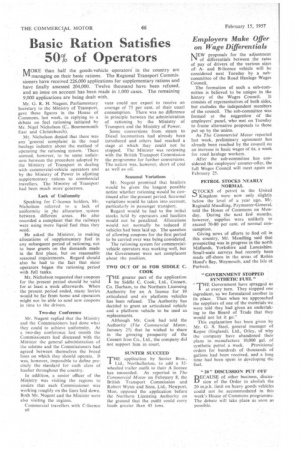Basic Ration Satisfies 50% of Operators
Page 42

If you've noticed an error in this article please click here to report it so we can fix it.
VIORE than half the goods-vehicle operators' in the country are I" managing on their basic rations. The Regional Transport. Commissioners have received 226,000 applications for supplementary rations and have finally assessed 204,000. Twelve thousand have been refused, and an issue on account has been made in 1,000 cases. The remaining 9,000 applications are being dealt with.
Mr. G. R. H. Nugent, Parliamentary Secretary to the Ministry of Transport, gave these figures in the House of Commons. last week, in replying to a debate on fuel rationing initiated by Mr. Nigel Nicholson (C., Bournemouth East and Christchurch).
Mr. Nicholson denied that there was any 'general complaint in the road haulage industry about the method of operating the rationing system. There seemed, however, to be some unfairness between the procedure adopted by the Ministry of Transport in dealing with .commercial-vehicle operators and by the Ministry of Power in agotting supplementary rations to commercial travellers. The Ministry of Transport had been much more generous.
Lack of Uniformity
Speaking for C-licence holders, Mr. Nicholson referred to a lack of uniformity in the allocation system between different areas. He also recorded a complaint that the railways were using more liquid fuel than they need.
He asked the Minister, in making allocations of supplementary fuel in any subsequent period of rationing, not to base grants on the demands made in the first place, but on reasonable seasonal requirements. Regard should also be had to the fact that most operators .began the rationing period with full tanks.
Mr. Nicholson requested that coupons for the present period should be valid for at least a week afterwards. When the present period ended, many lorries would be far from home and operators might not be able to send new coupons in time to the drivers.
Two-day Conference
Mr. Nugent replied that the Ministry and the Commissioners had done what they could to achieve uniformity. At a two-day conference last month the Commissioners had discussed with the Minister the general administration of the scheme and the Commissioners had agreed between themselves the broad lines on which they should operate. It was, however, impossible to define precisely the standard for each class of haulier throughout the country.
In addition, a senior officer of the Ministry was visiting the regions to ensure that each Commissioner was working toughly on the lines laid down. Bath Mr. Nugent and the Minister were also visiting the regions.
Commercial travellers with C-licence nR vans could not expect to receive an average of 75 per cent. of their usual consumption. There was no difference in principle between the administration of rationing by the Ministry of Transport and the Ministry of Power.
Some conversions from steam to Diesel locomotives had already been introduced and others had reached a stage at which they could not be stopped. The Minister was reviewing with the British Transport Commission the programme for further conversions. The nation was, however, short of coal as well as. oil.
Seasonal Variations Mr. Nugent promised that hauliers would be given the longest possible notice whether rationing would be continued after the present period. Seasonal variations would be taken into account, particularly in passenger transport.
Regard would be had to the initial stocks held by operators and hauliers would not be penalized. Allocations would not normally he reduced if vehicles had been laid up. The question of allowing coupons for the first period to be carried over was being considered.
The rationing system for commercialvehicle operators was working well, but the Government were not complacent about the position.
TWO OUT OF 16 FOR SIDDLE C.
COOK
T"greater part of the application by Siddle C. Cook, Ltd., Consett, Co. Durham, to the Northern Licensing Authority for an A licence for 10 articulated and six platform vehicles has been refused. The Authority has decided to grant an articulated vehicle and a platform vehicle to be used as_ replacements.
Although Mr. Cook had told the Authority (The Commercial Motor, January 25) that be wished to share in the growing prosperity of the Consett Iron Co., Ltd., the company did not support him in court.
SUNTER SUCCEED
THE application by Sunter Bros., Ltd., Northallerton, to add a 32wheeled trailer outfit to their A licence has succeeded. As reported in The Commercial Motor on February 8, the British Transport Commission and Robert Wynn and Sons, Ltd., Newport, Mon, opposed the application before the Northern Licensing Authority on the ground that the outfit could carry loads greater than 45 tons.




















































































































